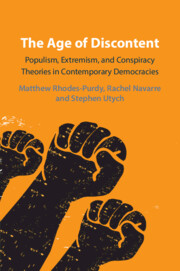Book contents
- The Age of Discontent
- The Age of Discontent
- Copyright page
- Dedication
- Contents
- Figures
- Tables
- Acknowledgements
- Abbreviations
- 1 Introduction
- 2 Left Behind vs. Backlash
- 3 Affective Political Economy
- 4 Affective Political Economy and Political Discontent
- 5 Frozen Parties, Failing Markets
- 6 Austerity, Regionalism, and Dueling Populisms in Spain
- 7 Corruption, Populism, and Contentious Politics in Brazil and Chile
- 8 The Dogs That Did Not Bark
- 9 Populism in Power
- 10 Conclusions
- References
- Index
1 - Introduction
Published online by Cambridge University Press: 02 March 2023
- The Age of Discontent
- The Age of Discontent
- Copyright page
- Dedication
- Contents
- Figures
- Tables
- Acknowledgements
- Abbreviations
- 1 Introduction
- 2 Left Behind vs. Backlash
- 3 Affective Political Economy
- 4 Affective Political Economy and Political Discontent
- 5 Frozen Parties, Failing Markets
- 6 Austerity, Regionalism, and Dueling Populisms in Spain
- 7 Corruption, Populism, and Contentious Politics in Brazil and Chile
- 8 The Dogs That Did Not Bark
- 9 Populism in Power
- 10 Conclusions
- References
- Index
Summary
The Introduction lays out the book. It introduces the concept of democratic discontent, explaining how it differs from milder forms of political displeasure and how it can manifest in different forms like populism, ethnonationalism, conspiracism, and antipathy to democratic regimes. It then briefly describes the conflict between economic and cultural approaches to discontent, showing that both make valid findings, yet neither hypothesis is totally consistent with existing research. To overcome this impasse, the chapter introduces the affective political economy theory of economics, emotions, and culture, where emotions induced by economic troubles prime large groups of citizens to embrace culturally discontented narratives; cultural discontent then produces various forms of discontent, based on local conditions. Finally, it lays out the book’s empirical approach, discussing the use of mixed methods to test the theory, including experiments, observational surveys, and qualitative analysis and comparison of cases; this section also justifies the case selections. This section advises different kinds of readers about which sections they might find most interesting and which might be less relevant, especially regarding statistically dense sections of the book.
Keywords
- Type
- Chapter
- Information
- The Age of DiscontentPopulism, Extremism, and Conspiracy Theories in Contemporary Democracies, pp. 1 - 24Publisher: Cambridge University PressPrint publication year: 2023



